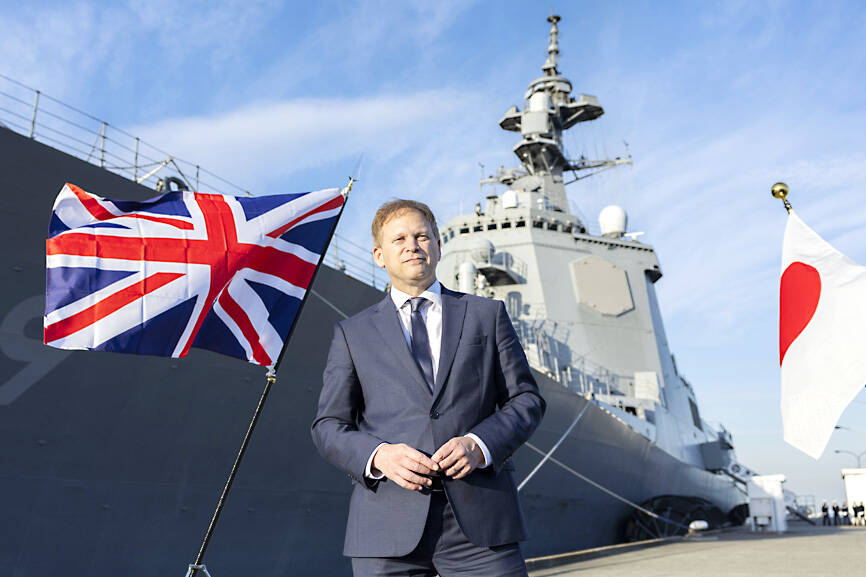The British Royal Navy has a right to transit through the Taiwan Strait, British Secretary of Defence Grant Shapps said yesterday, shortly after announcing that a carrier strike group would sail there.
Speaking in an interview with British newspaper the Times, Shapps said that international law protects freedom of navigation, including in the Taiwan Strait, but added that the path of the British warships had yet not been decided.
The carrier strike group, consisting of one aircraft carrier and escort ships, is to visit Japan as part of the flagship 2025 Indo-Pacific deployment, the British Ministry of Defence said in a news release.

Photo: EPA-EFE / MOD / CROWN COPYRIGHT
“The strength and global reach of the UK’s armed forces should never be underestimated,” Shapps was quoted as saying. “The carrier strike group 2025 is another tangible example of our ability to deploy globally.”
“Such deployments send a strong deterrence message while presenting important opportunities for engagements with key partners,” he said.
The carrier strike group represents a concentration of “cutting-edge air, surface and underwater defense” capabilities, but is also “a focal point for worldwide democratic activity,” the ministry said.
Separately yesterday, Representative to the US Alexander Yui called on the West to “not look the other way” in responding to a potential Chinese invasion of Taiwan.
“The best defense, best help that you can do for Taiwan ... is by actively, openly voicing your concerns that you will not accept Chinese aggression towards Taiwan,” Yui said in an interview with Politico.
Faced with a belligerent China that is preparing “very seriously to have the ability to invade Taiwan,” the nation has opted to “increase defense capabilities” in a bid to defeat “any possible aggressions in the future,” he said.
Drawing a parallel with the Russian invasion of Ukraine, Yui said the ongoing war “is a mirror to Taiwan,” which is also “facing an attack from a much larger country.”
Taiwan is seeking to improve its defensive capabilities as Kyiv did following Moscow’s illegal annexation of Crimea and part of the Donbas region in 2014, he said.
“So the threats are there and we want to preserve our way of life,” Yui said. “We want to preserve our democracy. We want to preserve liberties, and we will defend it.”
Beijing is expected to put immense pressure on Taiwan from the elections on Jan. 13 to the presidential inauguration in May to force the president-elect to make concessions to placate China in their inaugural speech, he said.
Additional reporting by CNA

Conflict with Taiwan could leave China with “massive economic disruption, catastrophic military losses, significant social unrest, and devastating sanctions,” a US think tank said in a report released on Monday. The German Marshall Fund released a report titled If China Attacks Taiwan: The Consequences for China of “Minor Conflict” and “Major War” Scenarios. The report details the “massive” economic, military, social and international costs to China in the event of a minor conflict or major war with Taiwan, estimating that the Chinese People’s Liberation Army (PLA) could sustain losses of more than half of its active-duty ground forces, including 100,000 troops. Understanding Chinese

The Ministry of Foreign Affairs (MOFA) yesterday said it is closely monitoring developments in Venezuela, and would continue to cooperate with democratic allies and work together for regional and global security, stability, and prosperity. The remarks came after the US on Saturday launched a series of airstrikes in Venezuela and kidnapped Venezuelan President Nicolas Maduro, who was later flown to New York along with his wife. The pair face US charges related to drug trafficking and alleged cooperation with gangs designated as terrorist organizations. Maduro has denied the allegations. The ministry said that it is closely monitoring the political and economic situation

UNRELENTING: China attempted cyberattacks on Taiwan’s critical infrastructure 2.63 million times per day last year, up from 1.23 million in 2023, the NSB said China’s cyberarmy has long engaged in cyberattacks against Taiwan’s critical infrastructure, employing diverse and evolving tactics, the National Security Bureau (NSB) said yesterday, adding that cyberattacks on critical energy infrastructure last year increased 10-fold compared with the previous year. The NSB yesterday released a report titled Analysis on China’s Cyber Threats to Taiwan’s Critical Infrastructure in 2025, outlining the number of cyberattacks, major tactics and hacker groups. Taiwan’s national intelligence community identified a large number of cybersecurity incidents last year, the bureau said in a statement. China’s cyberarmy last year launched an average of 2.63 million intrusion attempts per day targeting Taiwan’s critical

AGING: As of last month, people aged 65 or older accounted for 20.06 percent of the total population and the number of couples who got married fell by 18,685 from 2024 Taiwan has surpassed South Korea as the country least willing to have children, with an annual crude birthrate of 4.62 per 1,000 people, Ministry of the Interior data showed yesterday. The nation was previously ranked the second-lowest country in terms of total fertility rate, or the average number of children a woman has in her lifetime. However, South Korea’s fertility rate began to recover from 2023, with total fertility rate rising from 0.72 and estimated to reach 0.82 to 0.85 by last year, and the crude birthrate projected at 6.7 per 1,000 people. Japan’s crude birthrate was projected to fall below six,